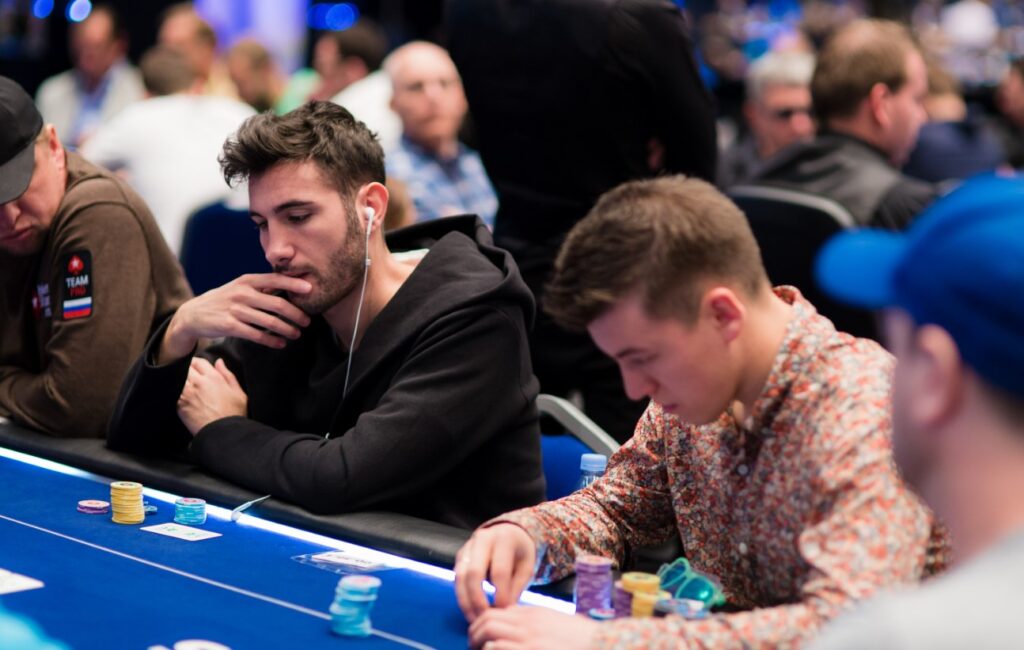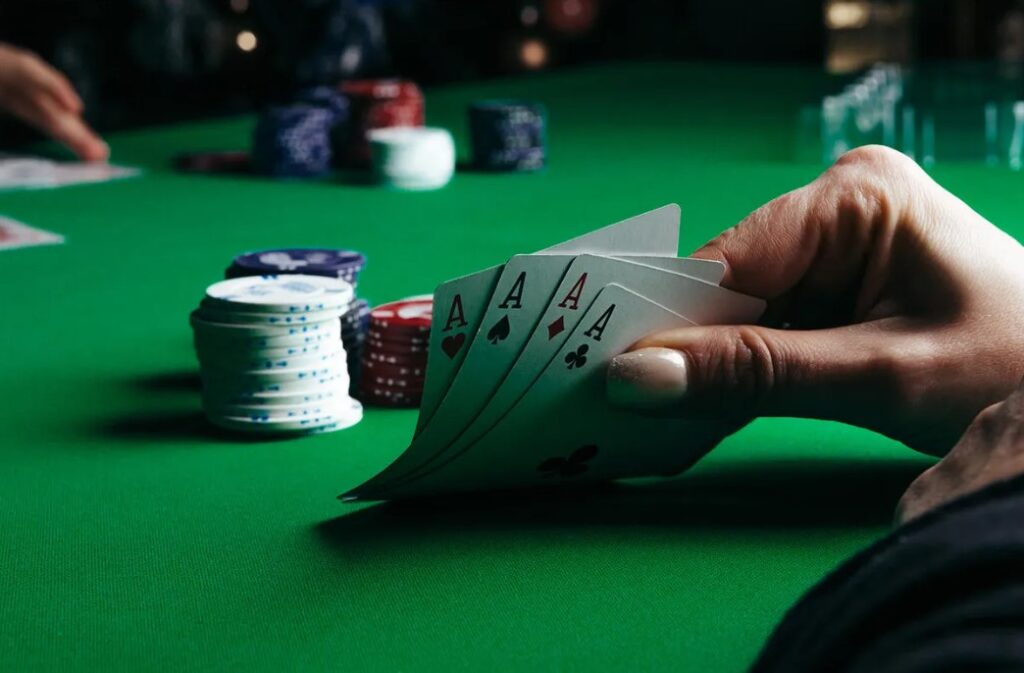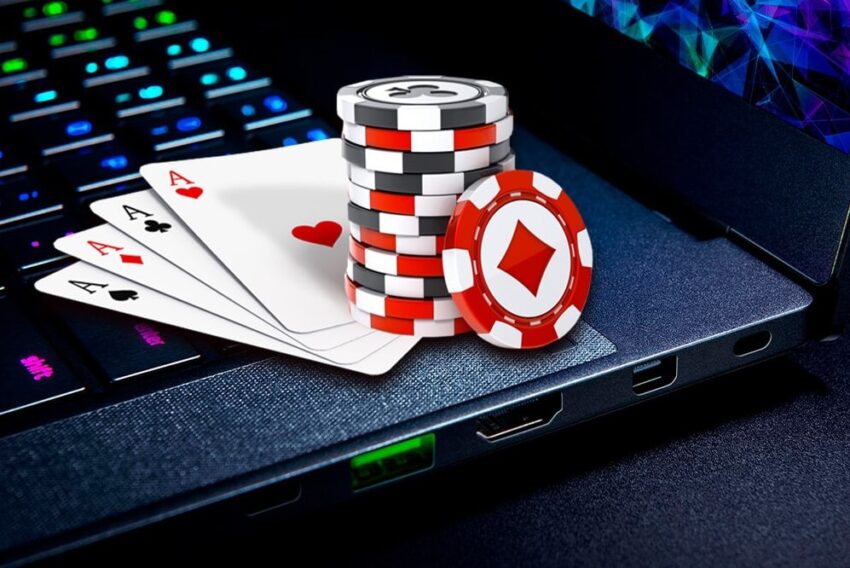Online poker is not just a game of chance; it’s a complex dance of strategy, psychology, and skill. While the cards you’re dealt play a role, success often lies beyond them.
For new players, understanding the intricacies of online poker theory can be the difference between a rookie mistake and a masterful play. Why not take a look at the best online poker sites in PA?
The Foundations of Poker Theory
Before you can master the game, it’s essential to understand its foundational theories.
- Expected Value (EV): At its core, poker is a game of decisions. Every action you take has an expected value, which is the average amount of money you expect to win or lose from that decision over the long run.
- Pot Odds: This is the ratio between the current size of the pot and the cost of a contemplated call. Understanding pot odds helps players make informed decisions about whether to continue with a hand.
Positional Play
Your position at the poker table can significantly influence your gameplay strategy.
Early, Middle, Late
Being in an early position means you act before most players, while a late position allows you to act after seeing how others play their hands. The latter is often more advantageous, as it provides more information.
Leveraging Position
Players in a late position can adjust their strategy based on the actions of those before them, allowing for more calculated risks or conservative plays.
Player Psychology

Online poker lacks the physical cues of traditional poker, but that doesn’t mean you can’t read your opponents.
- Betting Patterns: How a player bets can reveal a lot about their hand. Quick raises might indicate a strong hand, while hesitation could suggest uncertainty.
- Timing Tells: The speed at which a player makes a decision can be telling. Instant calls might indicate a draw, while delays could mean they’re calculating odds or bluffing.
Bankroll Management
Your bankroll is the total amount of money you’ve set aside for poker. Managing bankroll wisely is crucial for long-term success.
- Set Limits: Determine in advance how much you’re willing to risk in a single session. This prevents emotional decision-making during high-stakes moments.
- Avoid Chasing Losses: A common mistake is to try and recover losses by playing more aggressively. Stick to your strategy and know when to walk away.
The Art of Bluffing
Bluffing is an integral part of poker, but it’s an art, not a science.
Pick Your Moments
Bluffing works best when there’s a believable story. If the cards on the table suggest a potential strong hand that you could have, your bluff is more likely to succeed.
Know Your Opponents
Bluffing often depends on your read of other players. If someone is naturally cautious, a bold bluff might push them out of a hand.
Continual Learning

The world of online poker is ever-evolving. Strategies that worked yesterday might not be as effective today.
- Join Poker Communities: Engage with other players on forums, social media, or in-person groups. Share strategies, discuss plays, and learn from collective experiences.
- Review Your Games: Many online platforms allow you to review past games. Analyze your plays, identify mistakes, and refine your strategy.
Handling Tilt
Tilt refers to letting emotions, often from bad beats or losses, negatively affect your gameplay.
Recognize the Signs
If you’re feeling frustrated, anxious, or overly confident, take a break. Playing while emotional can lead to poor decisions.
Develop Coping Strategies
Find ways to calm down, whether it’s through deep breathing, taking a walk, or listening to music.
Diversify Your Game
Playing different variations of poker can enhance your skills and keep the game fresh.
- Explore Variants: From Texas Hold’em to Omaha, each game has its strategies and nuances. Diversifying helps you become a well-rounded player.
- Participate in Tournaments: Tournaments offer a different pace and strategy than cash games. They can be a valuable learning experience and offer significant rewards.
The Importance of Ethics
Fair play is crucial in the world of online poker. While it might be tempting to use software aids or collude with other players, these actions are unethical and can lead to bans.
Play Honestly
Respect the game and your opponents. Cheating tarnishes your reputation and undermines the spirit of the game.
Report Suspicious Activity
If you suspect other players of cheating, report them. It helps maintain a fair environment for everyone.
Embrace the Journey
Mastering online poker isn’t about winning every hand; it’s about growth, learning, and enjoying the game.
- Celebrate Small Wins: Every victory, no matter how small, is a testament to your skills and strategy.
- Learn from Losses: Instead of getting disheartened, view losses as learning opportunities. Analyze what went wrong and adjust your strategy accordingly.
Adapting to Different Players

Every player brings a unique style to the table. Adapting to these styles can give you a competitive edge.
Categorizing Opponents
Players often fit into categories like aggressive, passive, loose, or tight. Recognizing these styles can help you predict their moves.
Changing Your Tempo
If you’re always predictable, seasoned players will read you easily. Occasionally change your playing style to keep opponents on their toes.
The Digital Advantage
Online poker offers various tools and software to enhance your game, but use them judiciously.
- Poker Trackers: These tools can analyze your hands and provide insights into your gameplay, helping you identify strengths and weaknesses.
- Note Taking: Many platforms allow you to take notes on opponents. This can be invaluable in remembering how specific players act in certain situations.
Building a Poker Network
Networking isn’t just for business; it’s beneficial in poker too.
Mentorship
Finding a seasoned player to guide you can accelerate your learning. They can provide insights that might take you years to discover on your own.
Study Groups
Joining or forming a study group can provide diverse perspectives on strategy and gameplay.
Setting Realistic Goals
While it’s essential to aim high, setting achievable goals can keep you motivated and provide direction.
- Short-Term vs. Long-Term: Have both immediate goals (like refining a particular strategy) and long-term ones (like winning a specific tournament).
- Track Your Progress: Regularly review and adjust your goals based on your progress and learning.
The Importance of Breaks

Playing continuously can lead to burnout and decreased performance.
Scheduled Breaks
Just as you’d take breaks during work, ensure you step away from the poker table now and then.
Extended Time Off
Consider taking longer breaks after intense sessions or losses to refresh and regain perspective.
Staying Updated with Poker News
The poker world is dynamic, with ever-changing strategies, tools, and even rules.
- Follow Poker Blogs and Websites: Stay updated with the latest strategies, tournament results, and industry news.
- Engage in Webinars and Workshops: Many professionals host sessions sharing their expertise and insights. Participating can give you a fresh perspective on the game.
FAQs
What is Expected Value (EV) in poker?
Expected Value (EV) refers to the average amount of money a player expects to win or lose from a particular decision over the long run.
It’s a foundational concept in poker theory, helping players assess the potential profitability of their decisions.
How can I effectively read my opponents in online poker?
While online poker lacks physical cues, you can still gauge player tendencies through their betting patterns, timing tells, and gameplay style.
For instance, quick raises might indicate a strong hand, while consistent hesitation could suggest uncertainty.
What tools can I use to enhance my online poker gameplay?
There are several tools available, such as poker trackers, which analyze your hands and provide gameplay insights. Additionally, many online platforms allow note-taking on opponents, helping you remember specific player behaviors.
How important is my position at the poker table?
Positional play is crucial in poker. Being in a late position, for instance, allows you to act after seeing how others play their hands, providing more information and strategic advantages. Conversely, an early position requires more caution since fewer players have acted before you.
How can I manage my emotions and avoid going on tilt?
Recognizing the signs of tilt, such as frustration or overconfidence, is the first step. When you sense these emotions, take a break from playing.
Employ coping strategies like deep breathing, listening to calming music, or even stepping away from the game for a while.
Is it essential to diversify the poker games I play?
Diversifying your game can enhance your skills and offer fresh perspectives. Different poker variants have unique strategies and nuances.
By exploring various games, you become a more adaptable and well-rounded player. Plus, it keeps the game exciting and challenging.
Conclusion

Online poker is more than just a game of cards; it’s a blend of strategy, psychology, and continuous learning.
While the thrill of the game might draw you in, it’s the depth and complexity that keep players engaged for a lifetime. As you embark on your poker journey, remember that every decision, every bluff, and every fold is an opportunity to learn and grow.
By understanding the foundational theories, staying adaptable, and continuously seeking knowledge, you position yourself not just to play the game but to master it.
Whether you’re aiming for professional heights or simply enjoying the nuances of the game, the world of online poker offers endless opportunities for those willing to invest time and effort. So, shuffle up, deal, and may your poker journey be as rewarding as the game itself.

